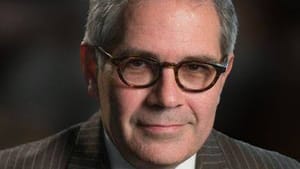Stay in the Loop
BSR publishes on a weekly schedule, with an email newsletter every Wednesday and Thursday morning. There’s no paywall, and subscribing is always free.
The district attorney's quandary
Larry Krasner's teachable moment

During his successful 2017 campaign for Philadelphia district attorney, Larry Krasner promised to end mass incarceration, focus on the most serious crimes, free the wrongfully convicted, treat addiction as an illness rather than a crime, and eliminate imprisonment for defendants who can’t raise bail. These positions reflected a growing recognition among liberals and conservatives alike that harsh punishment of criminals wastes precious public resources without improving public safety.
But now, as DA, Krasner must placate crime victims who feel neglected and even endangered because he doesn’t share their zeal for vengeance.
Six months after a beloved Spring Garden community leader named Gerry Grandzol was fatally shot outside his home in front of his small daughter, three nearby families (including Grandzol’s widow and daughters) departed for the suburbs, claiming they no longer felt safe in the city. Grandzol’s 16-year-old alleged killer, Marvin Roberts, was under Juvenile Court supervision for a prior robbery. Given a second chance, Roberts allegedly shot Grandzol twice in the head at point-blank range.
When Grandzol’s traumatized neighbors beseeched Krasner to prosecute Roberts “to the fullest extent of the law,” he reportedly responded with mealy-mouthed platitudes. (“We recognize our own failures. We are trying to correct that every day as we move forward.”) Then, presumably as a sop to the neighbors, he agreed to prosecute Roberts as an adult. (Read the Inquirer’s report here.)
Krasner is likely to encounter many such angry scenes during his tenure. If his approach to criminal justice makes sense — as I think it does — he must welcome these confrontations as teachable moments instead of slinking off apologetically. He must develop a proactive rhetorical response to grieving crime victims like Gerry Grandzol’s neighbors. Maybe something like this:
A 16-year-old’s brain
“If executing Marvin Roberts or jailing him permanently would bring Gerry Grandzol back to life, I would fight for it in a minute. If it would deter anybody else from committing a similar crime, I would do it. If it would make you or anyone else feel better or safer, I might consider it. But all the available research points to the opposite conclusion: harsh punishment doesn’t make people safer. According to psychologists, it doesn’t even bring a sense of peace or closure to the victims’ friends and relatives.
“Today we know something else we didn’t know a generation ago: the synapses of the brain often don’t grow together until the age of 25, which means many younger people don’t understand that actions produce lasting consequences. Marvin Roberts did a terrible thing, but trying him as an adult is a meaningless gesture that’s unlikely to prevent other 16-year-olds from committing the same crime. Locking up Marvin Roberts for life will keep him off the streets, but what’s the sense of keeping him off the streets, at great public expense, once his brain is sufficiently developed to understand right from wrong?
“One other point: Everything I’ve said assumes that we know with certainty the killer's identity. But prosecutors, judges, police officers, victims, and witnesses are all fallible human beings. They make mistakes. If we execute or lock up someone who subsequently turns out to be innocent, how would you react? Would you feel safe knowing the guilty party is still at large?
Tough vs. smart
“One more thing we know: Very few problems can be solved by throwing somebody in jail. Prisons breed crime. Prison sentences also devastate convicts’ innocent families. If we lock up Marvin Roberts for decades, we could spend $1 million or more to make him more dangerous and his family more desperate than they are now. If we really want to make our community safer, we should steer all but the hardest cases away from prison and into other forms of rehabilitation — therapy, counseling, job training, education, drug rehab, you name it. Otherwise, we’re just wasting our money and exacerbating our problem.
“You want a safe, civilized community. So do I. So did your dear neighbor Gerry Grandzol. Let’s put our heads together like civilized people and make the wisest use of the tools at our disposal.
“Some people think a prosecutor’s job is to convict criminals. But my real job is to reduce crime. Most of the time, talking tough and convicting defendants who can’t afford shrewd lawyers won’t make anybody safer. Thinking smart will.”
Sign up for our newsletter
All of the week's new articles, all in one place. Sign up for the free weekly BSR newsletters, and don't miss a conversation.

 Dan Rottenberg
Dan Rottenberg